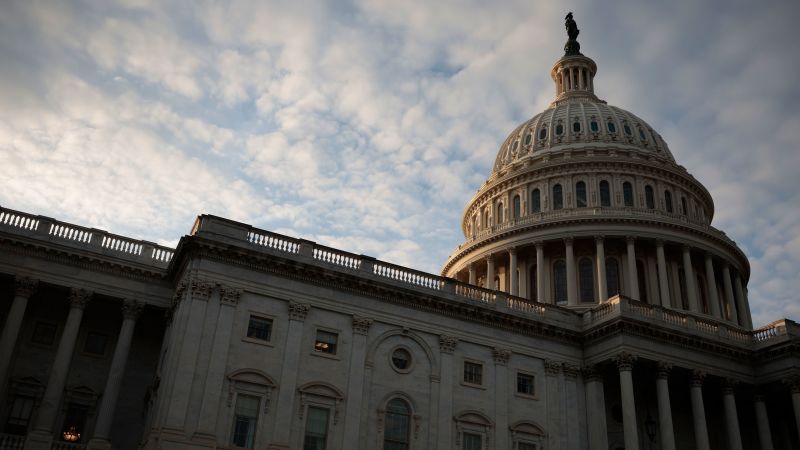
Sen. Sinema left the Democratic Party to register as an independent
The Democrat Senate in 2020: Where are we going? Where do we stand, and where will we go? What will we learn from high-profile campaign visits?
Democrats defied the odds – and most political handicappers’ predictions – to keep control of the Senate, as CNN projected over the weekend, making the December runoff between Raphael Warnock and Herschel Walker in Georgia seemingly less important.
There will be 33 Senate seats in the next ten years. Democrats will be defending 23 of them, compared to 10 for the Republicans. Even before we consider potential retirements and the like, the slate of seats look daunting for Democrats.
The most favorable political terrain for Republicans runs through three states that former President Donald Trump carried by at least 8 points in 2020 – West Virginia, Montana and Ohio. In all three, Democrats have incumbents with unique political brands who could again have crossover appeal with voters in a reelection race. And Republicans could face messy primary fights in all three states, leaving the eventual nominees weakened heading into the general election.
Montana Sen. Jon Tester has been a top target of Republicans ever since he was first elected in 2006, when he narrowly defeated GOP Sen. Conrad Burns in a favorable Democratic midterm environment. A self-described “seven-fingered dirt farmer” with a distinctive flat top haircut, Tester cuts a unique profile for a Democrat – one that has proved difficult for Republicans to pierce in previous elections.
Beyond that, Democrats are defending Senate seats in a handful of pivotal presidential battlegrounds – Arizona, Michigan, Nevada, Pennsylvania and Wisconsin. All are expected to be fiercely contested, with Arizona offering the potential for an unpredictable three-way race if Democrat-turned-independent Kyrsten Sinema seeks reelection. Given the overlay of the presidential race, these contests are most likely to see outsize attention with high-profile campaign visits, making them more connected to the national crosscurrents.
Jacky Rosen is up for reelection in Nevada. She won in 2018 with 50% of the vote, and given the long history of close statewide races in Nevada, has to be considered potentially vulnerable as well.
Democratic Sen. Bob Casey is facing reelection in a state that Biden very narrowly carried in 2020. John Fetterman was elected to the open Senate seat after Democrats flipped one of the seats and now he’s more of a commodity than the former state auditor general, who is known more for his integrity.
The two best pickup opportunities for Democrats are in Florida and Texas. The democrats took Florida last Tuesday and Sen. Rick Scott has to be pretty confident. John Cornyn proved once more that the Republicans are still in control of races in the state.
Sinema told Politico she will not caucus with Republicans. She doesn’t go to the weekly Democratic Caucus meetings but rarely does that now. She wrote in her opinion piece that she won’t change her work in the Senate because of her new status as an independent.
“In a natural extension of my service since I was first elected to Congress, I have joined the growing numbers of Arizonans who reject party politics by declaring my independence from the broken partisan system in Washington and formally registering as an Arizona Independent,” she tweeted.
The power balance in the Senate is not expected to change as a result of Sinema’s move. That includes two independents who caucus with them, Sens. Bernie Sanders of Vermont and Angus King of Maine.
But Sinema’s bipartisan approach to legislating had alienated many of her Democratic colleagues and constituents, particularly over the last two years, in an evenly divided Senate where any one vote could influence or derail a bill (even with the House and White House under Democratic control).
Over the last two years, she and fellow Democrat Joe Machin of West Virginia have been criticized as being obstructionists by regularly holding up or objecting to parts of legislation, as was the case with the budget package.
She acknowledged in Friday’s op-ed that her approach is rare in Washington and has upset partisans. It has delivered results for Arizona.
Sinema pointed to her work with colleagues on both sides of the aisle to pass legislation related to critical infrastructure, economic competitiveness, water issues, veterans’ benefits, marriage access for LGTBQ Americans and gun safety, among other issues.
She named several areas in which her position remains steadfast, for example that a women’s health care decision should be between her and her doctor, and her work to ensure fair and humane treatment for migrants.
“If anyone previously supported me because they believed, contrary to my promise, that I would be a blindly loyal vote for a partisan agenda – or for those who believe our state should be represented by partisans who push divisive, negative politics, regardless of the impact on our state – then there are sure to be others vying for your support,” she added.
Sinema is up for reelection in 2025. She declined to discuss pursuing a second Senate term, telling Poilitico, “It’s fair to say that I’m not talking about it right now.”
The president of Senate Majority PAC, a group closely associated with Senator Chuck Schumer, said some of the primary noise on their side suggests they haven’t learned much yet. There are lots of things that they are nervous about.
Getting Out Of Here: Dolan, Mandel, and Mr. Mooney Search for the Candidates Who Won’t Run for Reelection
State Senator Matt Dolan, a Republican who finished third in this year’s Senate primary, is poised to take on Brown, as is Josh Mandel, another Republican who courted Trump and his base.
Dolan, whose family owns the Cleveland Guardians, is already exploring the boundaries of what constitutes acceptable criticism of Trump. “What we witnessed nationally should convince us the country is ready for substantive candidates, not personalities and election deniers,” he wrote in a recent email to Republican county chairs in Ohio. But he said he would support Trump if he were the nominee.
Joe Manchin of West Virginia sounds intrigued by the decision of Sinema to become an independent. Manchin told reporters at the Capitol that he doesn’t know how you get more independent than him. “I look at all of these things, I’ve always looked at all of these things. But I have no intention of doing anything right now.”
Manchin already has an official Republican challenger: Representative Alex Mooney, who has telegraphed his line of attack in an anti-Manchin ad that ran four months ago. Attorney General Patrick Morrisey, who ran against Manchin in the legislature, and Gov. Jim Justice, who is not up for reelection, have shown interest.
The senate races could play out in a number of ways. While all signs point to President Joe Biden seeking reelection, he has yet to formally announce his intentions. Donald Trump is a clear front-runner for the GOP presidential nomination in less than two years.
Aside from the eventual nominees, the overall environment and mood of the country will also help shape contests up and down the ballot as well as the central campaign issues. The state of the US economy is a constant priority for voters. There are signs that parents’ rights could become a flash point in the general election, if culture issues are to drive the debate within GOP primaries.
Senate Republicans were unable to capitalize on what appeared to be a favorable midterm environment for them in 2022, in part because of flawed candidates, several of whom were elevated by Trump. Already this year, National Republican Senatorial Committee chair Steve Daines and other GOP leaders have sent signals that the committee could get involved in primaries if it means avoiding nominees who could cost the party in the general election.
Brown has already said that he’s running for reelection in 2024. Brown is the only Democrat to win a nonjudicial statewide race in Ohio over the past decade, demonstrating a measure of political resiliency in a GOP-trending state. Ohio was carried by Trump in 2020 and 2016 by 8 points. Yet Brown still managed to notch a nearly 7-point win in 2018, albeit against a relatively weak GOP challenger in then-Rep. Jim Renacci.
Brown has over 3 million dollars in his campaign funds as he prepares to battle for the governor’s seat in Ohio.
Defending Biden in the Wolverine State: Her State of the Union Address and The Role of Healthcare and Infrastructure in the GOP
Democratic Rep. Ruben Gallego has already entered the race, hoping to tap into progressives’ frustration with the moderate first-term senator for being an obstacle to parts of Biden’s agenda in the closely divided chamber. Sinema continues to caucus with her former party in the narrowly divided Senate, so national Democrats face a delicate decision if she runs for a second term. While Sinema and Gallego could split votes and help the eventual GOP nominee, Democrats, for now, are happy to deflect to potential messiness on the GOP side.
Republicans are considering Senate bids, and they include election deniers such as failed 2020 nominees, as well as one who says the governor election was stolen from her. CNN reported that Lake had met with NRSC officials earlier in the month, but she also held events in Iowa which could suggest interest in a different federal office. If you look at the Arizona GOP over the last few years, you will see that they have worked well in their late- summer primary but lost voters in the general election. The GOP rebuttal in Spanish to Biden’s State of the Union Address was delivered by freshman Rep. JuanCiscomani who was seen as a potential candidate.
Laxalt was the former state attorney general who lost last fall to Masto, as well as Sam Brown who also lost the Senate primary to Laxalt.
In 2016 and 2020, voters in the state narrowly chose Trump and Biden, making them presidential battlegrounds again next year. Baldwin will probably tout on the campaign trail the bipartisan infrastructure package enacted in 2021, which she supported, as a sign of her support for stronger “Buy America” policies. She had more than $3 million in the bank at the start of the year despite not announcing her reelection plans.
Mike Gallagher is a Republican who has been re-elected in 2016 and is one of the most well-known challengers. There’s an election in April for a state Supreme Court seat, which could affect the court’s partisan makeup – and potentially the state’s congressional map. The new district lines could cause some Republicans in the House to run for Senate.
The likelihood of a strong Democratic recruit running in the Wolverine State moves this contest slightly lower on the list of seats most likely to flip, even though an open seat would typically cost Democrats more money and be harder to defend. Possible Republican candidates include newly elected Rep. John James, who has lost two successive Senate races, and former Rep. Peter Meijer, who lost a 2022 primary. Meijer’s 2021 vote to impeach Trump after the January 6 insurrection, however, could make it more challenging for him to win a GOP primary.
The senator is from a family that is very influential in the state of Pennsylvania. Unlike his father, a two-term governor and leader in the anti-abortion movement, the younger Casey typically votes in favor of abortion rights even if he opposes the procedure personally. He announced in January he’d been diagnosed with prostate cancer but has an “excellent prognosis.”
Pennsylvania Republicans had a rough year in 2022, losing both the Senate and governor’s races with Trump-backed nominees. Dave McCormick, a hedge fund executive who lost out on his endorsement and the Senate nomination, is an attractive candidate for the GOP because of his wealth.
You will see a drop off in competitiveness if you get past the top eight races. Florida has shifted to the Republicans in recent years. Gov. Ron DeSantis and Sen. Marco Rubio both scored commanding reelection victories last year. Democrat Val Demings was a top-tier recruit who raised gobs of money and still lost to Rubio by 16 points.
That said, GOP Sen. Rick Scott, a former Florida governor who is seeking a second term next year, has a history of razor-thin general election wins. Democrats will use Scott’s agenda, which he revised after it angered some Republicans, as the basis of their campaign, just the same as Biden did last week with his post-State of the Union stop in Tampa.
But with Democrats defending so much turf this cycle, it’s hard to see the party investing heavily in trying to flip a Senate seat in Florida during a presidential year, especially given the vast personal resources Scott can plow into his campaign. Among the names being floated as potential Democratic challengers is former Rep. Stephanie Murphy, a moderate who represented an Orlando-area district until earlier this year.
In 2018, Democratic Rep. Beto O’Rourke generated national headlines and astronomical fundraising totals but still came up more than 2 points short against Texas Sen. Ted Cruz. While Cruz is seen as a potential 2024 presidential candidate, his focus for now appears to be on seeking a third term.
Beyond O’Rourke’s narrow loss, Texas has shown signs of moving toward Democrats, with Trump winning the state by less than 6 points in 2020 – the narrowest margin for the GOP since 1996. But Texas still a red state, as evidenced by Republican Gov. Greg Abbott’s double-digit reelection victory over O’Rourke last fall.

